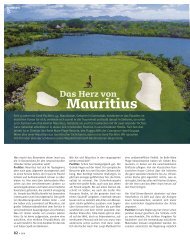Fußball-Wm 2006 angeblich gekauft
Fußball-Wm 2006 angeblich gekauft
Fußball-Wm 2006 angeblich gekauft
Sie wollen auch ein ePaper? Erhöhen Sie die Reichweite Ihrer Titel.
YUMPU macht aus Druck-PDFs automatisch weboptimierte ePaper, die Google liebt.
MONDAY, JULY 16, 2012 sÜddeutsche zeitung 3<br />
Climbing<br />
Paradise<br />
Forbidden<br />
By ALEX LOWTHER<br />
VALLE DE VIÑALES, Cuba — Here,<br />
the mountains weren’t pushed up from<br />
underneath, as mountains usually are.<br />
In this national park and Unesco World<br />
Heritage site, everything but the mountains<br />
fell down. The mogotes, islands of<br />
limestone, are gently domed, like loaves<br />
of crusty bread, but the sides seem to<br />
have been cleaved off, leaving terrain that<br />
drops precipitously to the valley floor.<br />
In the late 1990s, rock climbers found a<br />
paradise where the walls of the mogotes<br />
are too steep for the otherwise ubiquitous<br />
crawling vines and striving trees. Overhangs,<br />
some 150 meters tall, are covered<br />
with chandeliers of stalactites and blobs<br />
and pockets, all perfectly formed for human<br />
hands and feet to climb from the bottom<br />
of a cliff to its top.<br />
Soon, locals caught on, and a flourishing<br />
climbing scene took hold. Viñales became<br />
a top destination for climbers from Europe,<br />
Canada and the United States. Hun-<br />
Tourism and sport<br />
are threatened by an<br />
inexplicable ban.<br />
dreds of routes went up the major mountain<br />
faces in the valley, and for years visiting<br />
climbers had essentially free rein.<br />
No longer. In late March, even as Pope<br />
Benedict XVI called for “authentic freedom”<br />
in Cuba before an estimated 200,000<br />
people in Havana, climbers here, a threehour<br />
drive west of Havana, the capital,<br />
are wrestling with the prohibition of their<br />
sport, which has been enforced since the<br />
beginning of this year. In an era when<br />
the Cuban government has been easing<br />
restrictions it seems to have moved in a<br />
sharply different direction here, threatening<br />
the prosperity of Viñales and the<br />
future of the sport in Cuba by enforcing a<br />
ban on climbing and regulating independent<br />
tourism in general.<br />
Jens Franzke, a climber from Dresden,<br />
Germany, here with his wife, Ina, for three<br />
weeks, was fed up. “It feels like East Germany<br />
before the fall of the Berlin Wall,” he<br />
said. “There are all these rules, and none<br />
of them make any sense.”<br />
Mr. Franzke, 46, and his wife had been<br />
forced to stop climbing multiple times,<br />
threatened by park guards and told that<br />
the “Cuba Climbing” guidebook they were<br />
using to find routes in the valley was illegal<br />
to use because the authors do not live<br />
in Cuba.<br />
“It’s a real shame because it’s such a<br />
paradise,” Mr. Franzke said. The couple<br />
had climbed nearly every day they wished<br />
by evading the rules and the guards, but<br />
“we will never come back,” he said.<br />
This is the main worry for residents and<br />
climbers. Viñales is the hub of the valley<br />
and the heart of Viñales National Park.<br />
The bustling town has a population of<br />
By LYDIA POLGREEN<br />
JOHANNESBURG — It was exactly<br />
the kind of case the International Criminal<br />
Court was created to investigate: Yemen’s<br />
autocratic leader was clinging to<br />
power, turning his security forces’ guns<br />
on unarmed protesters.<br />
But when Yemen’s Nobel laureate,<br />
Tawakkol Karman, traveled to The Hague<br />
to ask prosecutors to investigate, she was<br />
told the court would first need the approval<br />
of the United Nations Security Council.<br />
That never happened, and today the former<br />
president, Ali Abdullah Saleh, is living<br />
comfortably in Yemen’s capital, still<br />
wielding influence.<br />
Now, as the world confronts evidence<br />
of atrocities in Syria as President Bashar<br />
al-Assad’s government battles a growing<br />
rebellion, there are signs that Mr. Assad,<br />
too, will evade prosecution.<br />
The men have not been prosecuted<br />
because they have powerful allies in the<br />
Security Council. That now threatens to<br />
undermine the still-fragile international<br />
consensus that formed the basis for the<br />
court’s creation in 2002: that leaders<br />
should be held accountable for crimes<br />
against their own people.<br />
Already, the failure to act against some<br />
Arab leaders has critics saying the court’s<br />
justice is reserved for outcast leaders, including<br />
an assortment from weak African<br />
states.<br />
“We have the feeling that international<br />
justice is not ruled by law,” said Rami Nakhla,<br />
an exiled Syrian activist. “It depends<br />
on the situation, it depends how valuable<br />
this person is. That is not real justice.”<br />
Yet the dream of a world court that could<br />
prosecute crimes against humanity is<br />
closer than ever to reality. Three former<br />
heads of state are in custody of international<br />
courts, and one, Charles Taylor, has<br />
been convicted. The International Criminal<br />
Court has convicted one defendant,<br />
Thomas Lubanga, a Congolese psychologist<br />
turned warlord who recruited child<br />
soldiers, and sentenced him to 14 years in<br />
prison. A former Bosnian Serb general,<br />
ALEX LOWTHER FOR THE NEW YORK TIMES<br />
Valle de Viñales, in Cuba. Climbing has been banned here since 2003.<br />
about 17,000 with more than 300 private<br />
boardinghouses that rent rooms to tourists.<br />
All that has allowed the valley to<br />
overcome the poverty typical across the<br />
country.<br />
Cuban climbers rely on tourists to donate<br />
shoes, harnesses and ropes to climb.<br />
Equipment is not available, and even if<br />
it were, it would cost too much in a country<br />
where government salaries average<br />
$15 to $25 a month. Without new donations,<br />
shoes, harnesses and ropes wear<br />
out. Without replacement, the bolts in the<br />
rock that secure climbers would corrode<br />
and eventually become unsafe. Climbing<br />
would become, essentially, impossible.<br />
Climbing was prohibited in 2003, four<br />
years after major climbing development<br />
started. The state deemed climbing a factor<br />
in peligrosidad, a vague designation of<br />
being dangerous to the state. It is an offense<br />
punishable by imprisonment. The climbing<br />
ban was never formally announced, nor<br />
was it enforced for tourists at all. For Cubans<br />
it was often a mere hassle, but consequences<br />
could be more severe. One veteran<br />
Cuban climber was put on notice of being<br />
considered peligroso in 2010, and several<br />
others were taken to the police station and<br />
had reports drawn up. This seems to have<br />
been more likely if the climbers were climbing<br />
and socializing with foreigners, which<br />
the state frowns upon.<br />
Since at least 2003, an explanation has<br />
been circulating that the government is<br />
Ratko Mladic, is appearing before a tribunal<br />
created to try accused war criminals<br />
from the former Yugoslavia.<br />
But the court can investigate crimes<br />
only in nations that have signed the Rome<br />
Statute, which created the court, unless<br />
the Security Council refers a case.<br />
“So many crimes have been committed<br />
here,” said Nabeel Rajab, a rights activist<br />
in Bahrain, where the royal family, with<br />
help from Saudi Arabia and the acquiescence<br />
of the United States, has used force<br />
to put down a pro-democracy uprising.<br />
“But because of the close relationship<br />
between Western powers and the government<br />
of Bahrain, how can we hope for<br />
justice?”<br />
busy organizing a system through which<br />
one would buy a daily pass or license to<br />
climb. No such pass yet exists.<br />
Many of the cliffs where climbing takes<br />
place are part of the national defense plan<br />
in case of attack, and climbers suspect<br />
that state security officials are worried<br />
that the Cubans and foreigners are there<br />
organizing against the government.<br />
Owners of casas particulares, as the<br />
private boardinghouses are called, said<br />
warnings about the rules were overblown.<br />
Oscar Jaime Rodriguez, owner of<br />
a boardinghouse that is the de facto base<br />
camp for climbers in the valley, sought to<br />
quiet fears. “They are always saying, ‘It’s<br />
prohibited, it’s prohibited,’ but climbers<br />
still come and they still climb,” he said.<br />
“It’s worth it.” (Since reporting there concluded<br />
at the end of March, climbers have<br />
said enforcement of the no climbing rule<br />
may have become more lenient.)<br />
On their last day in Cuba, after an unmolested<br />
climbing session in warm early<br />
morning sun and a “coco loco” cocktail<br />
in the shade, the Franzkes reconsidered<br />
their vow never to return.<br />
“Maybe all of the not so good stuff about<br />
Cuba will leave my memory,” Jens Franzke<br />
said. “I’ll just remember the beautiful<br />
people, the red soil, the salsa.” Mr. Franzke<br />
looked at the drink in his hand, smiled<br />
and said, “The coco loco.” He looked in the<br />
direction of the mogotes, and added, “And<br />
the spectacular climbing.”<br />
Uprisings Expose Global Court Flaws<br />
SAMUEL ARANDA FOR THE NEW YORK TIMES<br />
Tawakkol Karman sought<br />
international justice for protesters<br />
killed in Yemen’s uprising.<br />
Powerful allies let<br />
officials elude justice<br />
in The Hague.<br />
The court has 120 member states, but<br />
three of the five veto-holding members of<br />
the Security Council — the United States,<br />
Russia and China — are not among them.<br />
Despite this, the court has turned into a<br />
touchstone for justice-seekers. The Security<br />
Council allowed the court to investigate<br />
Sudan’s president, Omar Hassan<br />
al-Bashir, who was indicted on charges<br />
of war crimes in Darfur, though the court<br />
has been unable to apprehend him.<br />
And in February 2011, the Security<br />
Council asked the International Criminal<br />
Court to investigate the Libyan government<br />
led by Colonel Muammar el-Qaddafi.<br />
The court handed down indictments<br />
against Colonel Qaddafi and several top<br />
officials, though he was killed in Libya before<br />
he could face prosecution.<br />
But the court has not taken action in<br />
any other Arab uprising, in no small part<br />
because of the ties between the countries<br />
involved and veto-holding members of<br />
the Security Council. Bahrain and Yemen<br />
are allies of the United States. Russia and<br />
China are close to Syria’s government.<br />
Debates have raged about whether<br />
the court, by closing off a graceful exit,<br />
makes dictators more likely to fight to the<br />
death.<br />
But supporters say the court has<br />
achieved more than expected. “The assumption<br />
was the court will take years to<br />
come into effect,” said Darryl Robinson,<br />
who worked as an adviser to the International<br />
Criminal Court’s prosecutor. “And<br />
once it is in force it is going to be this court<br />
with jurisdiction over Canada and Norway,<br />
with nothing to investigate.”<br />
Instead, much of the world has signed<br />
up, and protesters in Yemen, Bahrain,<br />
Libya and Syria have demanded that their<br />
leaders be sent to The Hague for trial. The<br />
deeper question is whether the failure to<br />
prosecute the autocrats of the Arab Spring<br />
will erode faith in the movement toward a<br />
system of international justice.<br />
Richard Dicker of Human Rights Watch<br />
said: “For justice to be legitimate, it is essential<br />
that it be applied equally to all.”<br />
world trends<br />
A Bruised Iceland Is Healing Nicely<br />
By SARAH LYALL<br />
REYKJAVIK, Iceland — For a country<br />
that four years ago plunged into a financial<br />
abyss so deep it all but shut down overnight,<br />
Iceland seems to be doing surprisingly<br />
well.<br />
It has repaid, early, many of the international<br />
loans that kept it afloat. Unemployment<br />
is hovering around 6 percent, and falling.<br />
And while much of Europe is struggling<br />
to pull itself out of the recessionary swamp,<br />
Iceland’s economy is expected to grow by<br />
2.8 percent this year.<br />
“Everything has turned around,” said<br />
Adalheidur Hedinsdottir, who owns the<br />
coffee chain Kaffitar, and has plans to open<br />
a new cafe and bakery. “When we told the<br />
bank we wanted to make a new company,<br />
they said, ‘Do you want to borrow money?’ ”<br />
she went on. “We haven’t been hearing that<br />
for a while.”<br />
Analysts cite the surprising turn of<br />
events to a combination of fortuitous decisions<br />
and good luck, and caution that the<br />
lessons of Iceland’s turnaround are not<br />
readily applicable to the larger and more<br />
complex economies of Europe.<br />
But during the crisis, the country did<br />
many things different from its European<br />
counterparts. It let its three largest banks<br />
fail, instead of bailing them out. It ensured<br />
that domestic depositors got their money<br />
back and gave debt relief to struggling homeowners<br />
and to businesses facing bankruptcy.<br />
“Taking down a company with positive<br />
cash flow but negative equity would in the<br />
given circumstances have a domino effect,<br />
causing otherwise sound companies to<br />
collapse,” said Thorolfur Matthiasson, an<br />
economics professor at the University of<br />
Iceland. “Forgiving debt under those circumstances<br />
can be profitable for the financial<br />
institutions and help the economy and<br />
reduce unemployment as well.”<br />
Iceland also had some advantages when<br />
it entered the crisis: relatively few government<br />
debts, a strong social safety net and a<br />
fluctuating currency whose rapid devaluation<br />
in 2008 caused pain for consumers<br />
but helped buoy the all-important export<br />
market. Government officials, who at the<br />
height of the crisis were reduced to begging<br />
for help from places like the Faroe Islands,<br />
are now cautiously bullish.<br />
“We’re in a very comfortable place because<br />
the government has been very stable<br />
in fiscal terms and is making good progress<br />
in balancing its books,” said Gudmundur<br />
Arnason, the Finance Ministry’s permanent<br />
secretary. “We are self-reliant and can<br />
borrow on our own without having to rely<br />
on the good will of our Nordic neighbors”<br />
or lenders like the International Monetary<br />
Fund.<br />
But not even Mr. Arnason says he believes<br />
that all is perfect. Inflation, which<br />
reached nearly 20 percent during the crisis,<br />
is still running at 5.4 percent, and even with<br />
the government’s relief programs, most of<br />
the country’s homeowners remain awash<br />
in debt, weighed down by inflation-indexed<br />
mortgages in which the principal, disastrously,<br />
rises with the inflation rate. Taxes<br />
are high. And with the country’s currency,<br />
the krona, worth between about 40 and 75<br />
percent of its pre-2008 value, imports are<br />
punishingly expensive.<br />
Strict currency controls, imposed during<br />
Good decisions and luck<br />
speed a return from the<br />
financial abyss.<br />
the crisis, mean that Icelandic companies<br />
are forbidden to invest abroad.<br />
At the same time, foreigners are forbidden<br />
to take their money out of the country<br />
— a situation that has tied up foreign investments<br />
worth, according to various estimates,<br />
between $3.4 billion and $8 billion.<br />
“The capital controls are worse and<br />
worse for companies, but the fear is that if<br />
we lift them, the value of the krona will collapse,”<br />
Professor Matthiasson said.<br />
He said the only solution would be for Iceland<br />
to dispense with the krona and join a<br />
larger, more stable currency. The choices<br />
at the moment seem to be the euro, which is<br />
having its own difficulties,<br />
and the Canadian<br />
dollar.<br />
Not everyone buys<br />
into the rosy picture<br />
presented by officialdom.<br />
Jon Danielsson,<br />
an Icelander who<br />
teaches global finance<br />
at the London School of<br />
Economics, said that<br />
both the International Monetary Fund,<br />
which bailed Iceland out during the crisis,<br />
and the government had a vested interest in<br />
painting a positive picture of the situation.<br />
Some Icelanders say they have been<br />
soothed by the country’s bold decision to<br />
initiate an extensive criminal investigation<br />
into the financial debacle.<br />
A visit to Iceland late last month revealed<br />
a far different place from the shellshocked<br />
nation of 2008. Stores and hotels were full.<br />
The Harpa, a glass-and-steel concert hall<br />
and conference center designed in part by<br />
the artist Olafur Eliasson and opened in<br />
2011, soared over the Reykjavik skyline,<br />
next to a huge construction site that is to<br />
house a luxury waterside hotel. Employers<br />
said that instead of having to lay off workers,<br />
they were in some cases having trouble<br />
finding people to hire.<br />
Icelanders said that they had stopped<br />
feeling ashamed and isolated, the way that<br />
they did during the worst of the crisis, when<br />
their country was portrayed as a greedy<br />
and foolish pariah state and its British assets<br />
were frozen by the British government<br />
using the blunt and humiliating instrument<br />
of antiterror legislation.<br />
“We went through this complicated and<br />
terrible experience and were in the center<br />
of world events,” said Kristrun Heimisdottir,<br />
a lecturer in law and jurisprudence at<br />
the University of Akureyri in northern Iceland.<br />
She compared Iceland’s shame to that of<br />
a private person thrust onto the front pages<br />
by a lurid scandal. “It might take 20 years<br />
to recover from the stress and humiliation<br />
of having their personal life paraded before<br />
the world,” she said. “But it turned out that<br />
what happened to us was a microcosm of<br />
the whole crisis.”<br />
ANDREW TESTA FOR THE NEW YORK TIMES<br />
After its free fall,<br />
Iceland’s economy<br />
is expected to<br />
grow 2.8 percent<br />
this year. Window<br />
shoppers strolling in<br />
Reykjavik.
















